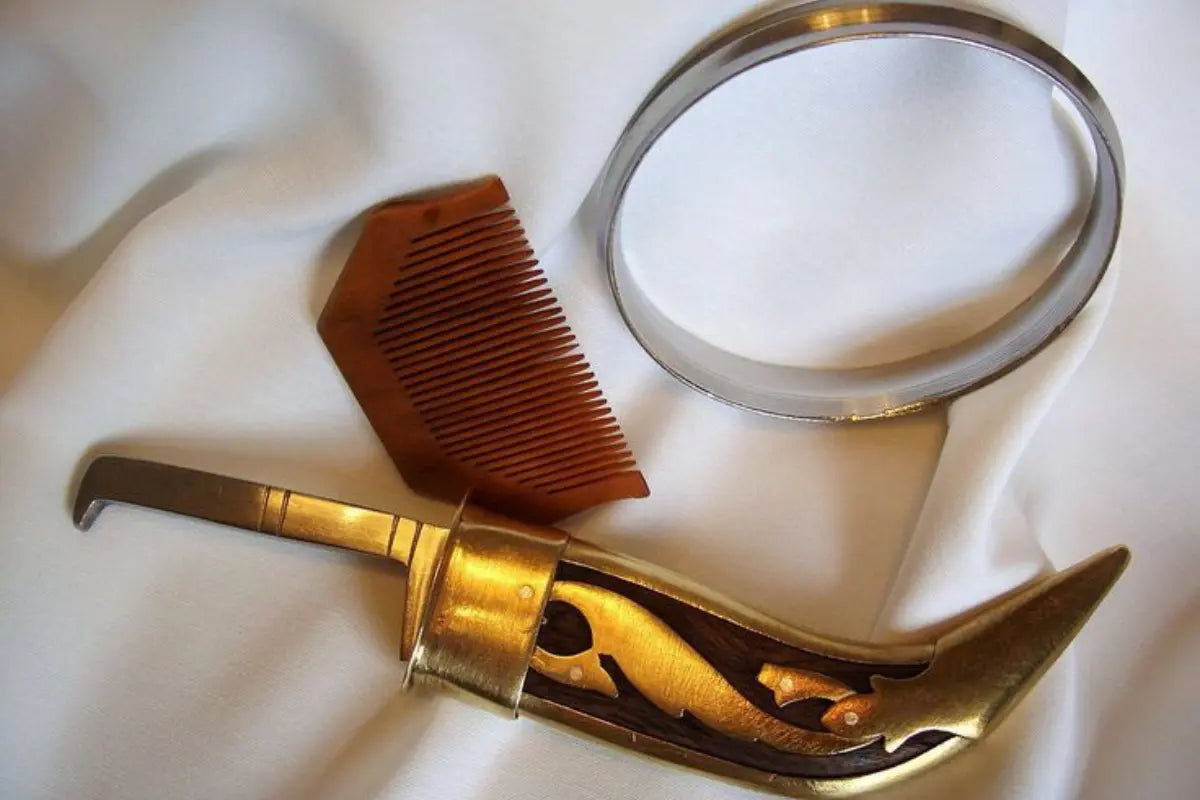Sikhism, a faith rooted in equality, service and devotion, holds rich spiritual and cultural traditions. Among its most sacred practices is the wearing of the Five Ks, also known as Panj Kakaar — the five Sikh articles of faith that represent a deep commitment to the values and identity of Sikhism.
In this blog, we offer a respectful and informative guide to understanding each of the Five Ks, their spiritual significance and how they continue to shape the daily lives and discipline of practicing Sikhs.
What Are the Five Ks (Panj Kakaar)?
The Five Ks were established in 1699 by Guru Gobind Singh Ji, the tenth Sikh Guru, when he founded the Khalsa Panth. Each of these items begins with the letter 'K' in Punjabi and serves as a reminder of the Sikh’s duty to uphold righteousness, discipline, and humility.
1. Kesh (Uncut Hair)
Kesh symbolizes respect for God’s creation. Sikhs do not cut their hair to honour the natural form bestowed by the Creator. Maintaining kesh reflects discipline and acceptance of God's will. Hair is typically covered with a turban (dastaar), which signifies dignity, honour, and spiritual focus.
To support the care of kesh, many Sikhs use accessories like salai or baaj for styling turbans or dumalla. These tools, often made of lightweight, durable materials, aid in respectful grooming and daily turban tying.
2. Kangha (Wooden Comb)
Kangha is a small wooden comb used to keep hair clean and untangled. It represents cleanliness, order, and mindfulness. Sikhs use the kangha twice a day and keep it tucked in their hair under the turban.
Traditionally made from natural wood, kanghas serve both a practical and symbolic purpose, reminding the wearer of inner and outer discipline. You can find handcrafted kanghas made with care and reverence from sources that honour Sikh traditions.
3. Kara (Iron Bracelet)
Kara is a circular iron or steel bracelet worn on the dominant wrist. It signifies unity with God, a constant reminder to act righteously, and the eternal nature of the Creator. It also symbolises strength and restraint from negative actions.
Karas can vary in design—some are plain and simple, while others may have engraved patterns. The key is the material (iron or steel) and the unbroken circular form that reflects the infinite. You can explore Sikh karas thoughtfully designed to reflect both tradition and spiritual intent at Akaal Accessories.
4. Kachera (Cotton Undergarment)
Kachera is a symbol of modesty and moral strength. This cotton undergarment represents self-control and readiness to act with dignity. Unlike regular undergarments, kachera is specially tailored and worn as a symbol of honour and discipline.
It is tied with a drawstring and designed for practicality, especially for physical readiness and modesty, reflecting a martial and moral code.
5. Kirpan (Spiritual Sword)
Kirpan represents courage, self-defence, and the duty to stand against injustice. It is not just a weapon but a sacred symbol of a Sikh’s responsibility to protect the weak and uphold righteousness. The kirpan must be worn with reverence and is to be used only as a last resort.
While styles and sizes may vary, kirpans often reflect intricate craftsmanship. You can find carefully kirpans that are created with traditional values in mind from trusted sources such as Akaal Accessories.
The Five Ks: Symbols and Their Deeper Significance
Each article of faith serves as a spiritual compass, guiding behaviour and reminding Sikhs of their higher purpose. Here's a closer look at the symbolism behind the Five Ks:
- Kesh: Trust in divine creation and embracing natural form.
- Kangha: Cleanliness, discipline, and control over the mind and body.
- Kara: Unbreakable connection to God, commitment to righteousness.
- Kachera: Purity in thought and deed, readiness for moral conduct.
- Kirpan: Protection of justice and a vow to safeguard humanity.
These Sikh symbols are more than external signs—they represent internal virtues cultivated through spiritual practice.
Living with the Five Ks: Daily Devotion and Discipline
Wearing the Five Ks is a daily act of devotion. It demands mindfulness, respect, and a commitment to uphold Sikh values. Each item becomes part of daily routine cleaning the kangha, tying the turban, keeping the kara visible while working—all serve as quiet yet powerful affirmations of faith.
Many aso look for Sikh accessories UK that help them uphold these traditions with dignity and practicality. From handcrafted kanghas to durable karas and functional turban salais, these tools blend tradition with usability.
At Akaal Accessories, we understand the spiritual significance of these items and aim to offer thoughtfully made products that respect and honour their religious purpose.
The Panj Kakaar are more than symbolic attire, they are spiritual tools that guide actions and character. In daily life, Sikhs take care to maintain and wear them with respect, often sourcing practical and high-quality items that suit traditional requirements.
For those seeking essential Sikh accessories like turban salai, kanghas, or karas, there are thoughtful options available that align with both tradition and contemporary needs. These items are often handcrafted with attention to Sikh values, helping individuals preserve their articles of faith with care and dignity.



